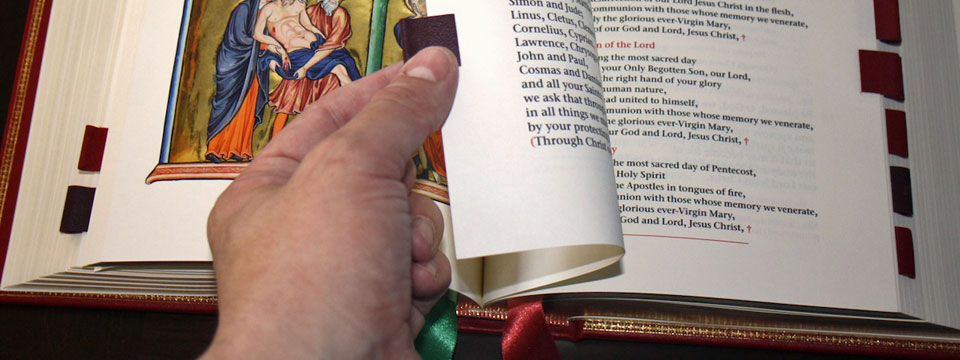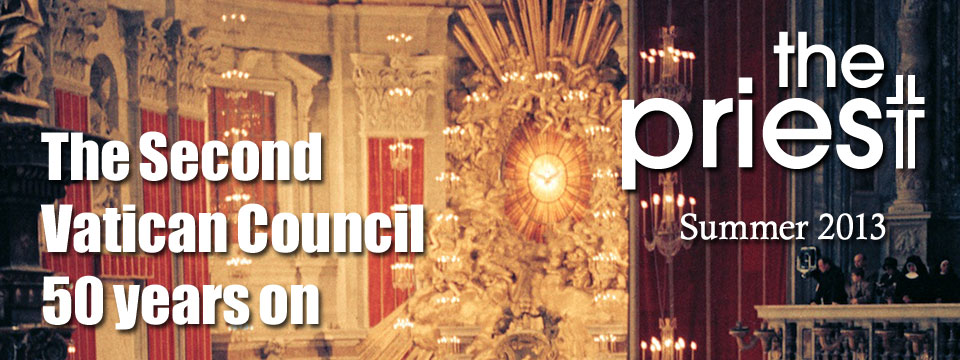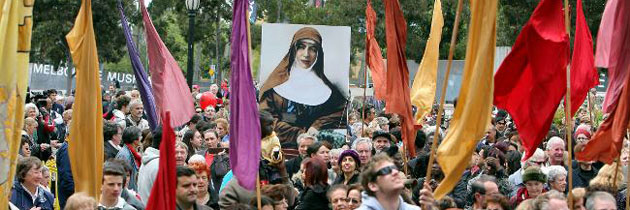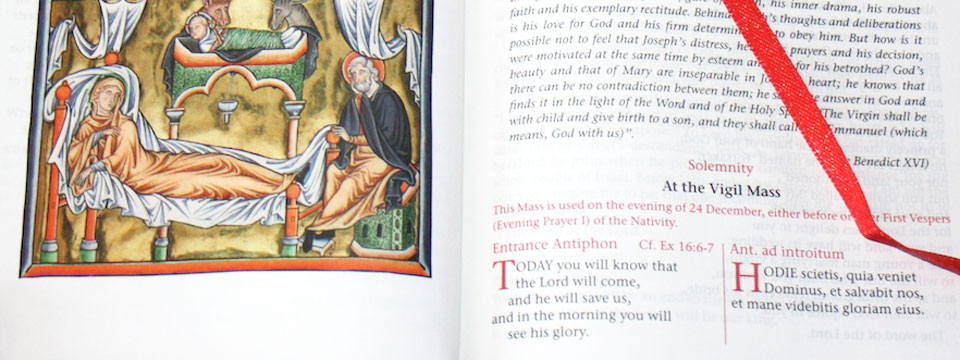The current religious scene of occasional and cultural Catholics
Catholics in the Western world are facing a bit of a liturgical crisis. We have more and more members who are “cultural” and “occasional” Catholics. They perhaps know more about various forms of Eastern mysticism than they know about Christianity. And they have attended so many “naming ceremonies”, weddings and funerals conducted by civil celebrants that they see those rituals as normative, and what the Church provides is perceived as being “old fashioned”. We need to be proactive in influencing our people to a lively appreciation of the perennial significance of our liturgical celebrations, and how fitting celebration of them taps into what is both immemorial and contemporary: what meets our deepest human needs.
I briefly now look at some of the signals that priests and people are not looking at the liturgy as Divine Worship.
Baptisms. Never mind that civil celebrations have been around for less than two generations; they are now the norm. Because many “naming ceremonies” take place at home, Catholic parents are asking for baptisms at home, rather than in the parish church, the “family home of Christian families”. Parents offer to write their own “baptismal promises” for their children, which are usually no more than a list of wishes for the child’s health, success (in work and in sport) and happiness in this life, with no mention of redemption or eternal life.
Marriages. Many civil weddings are held in gardens, parks, hotel ballrooms and on beaches, and so priests are being begged to bow to this trend. Houses of worship now resound with pre-recorded concerts of the “top ten” hits before the liturgy begins. Sacred songs are replaced by secular tunes that glorify personal romance but say nothing of community love, much less God’s love. Secular readings and poems are presented as alternatives to the Scriptures, with the result that many a weak priest has allowed such texts to be read along side, or even in replacement of, the revealed Word of God. The Church’s wedding promises are “supplemented” by “more personal vows” which speak of many happy things the couple looks forward to sharing, but rarely fidelity or permanence or children – and again, no mention of anything spiritual. The couple joins in “presiding” over the liturgy from their places facing the assembly, with the claim that because the couple marry one another (true), therefore they should preside over the entire liturgy (false). And then the altar of sacrifice is used as a writing desk, with not only the bridal couple and their witnesses signing documents there, but often flower girls and ring bearers, and perhaps the couple’s children, all of whom break into peals of laughter as the photographer(s) and videographer(s) swarm around. (The rubrics do allow religious professions to be signed at the altar, but that is because those promises are made to God, not to human beings.)
Funerals. As for funerals: with the advent of televised memorial services, not only for state dignitaries but for comedians and singers as well, Catholic viewers viewing these programs may say to themselves, “That was nice – I think I’ll have that at my funeral (or my spouse’s, or my parent’s funeral).” And so there are queues of eulogists (most of whom say exactly the same thing, and not all of it tasteful or discreet), This Was Your Life displays of photos and personal belongings in the sanctuary and around the casket, the obligatory secular music throughout the service and, to cap it all off, a magnificent balloon release accompanied by a blasting recording of Frank Sinatra warbling, I Did It My Way.
Lest you think I am irretrievably cynical about all of this, I must assure you that I am not opposed to many of these things – as long as they are not done in church, during divine worship. Even celebrities seem to have the sense, after the public memorial service is concluded, to bring their family and friends to a private funeral service, conducted with simplicity by a clergyman, in contrast to the public event. This is what the clergy should encourage: testimonials, speeches, beloved secular songs and readings; but at the baptismal luncheon, the wedding reception, or the wake – not in the church, and not within the Church’s liturgy. Baptisms, weddings and funerals are divine worship. They mark important events in our lives, true; but they are important events in our life in Christ, and our life lived in his Church. They are not simply tribal rites of passage.
Sacrament of Penance. It may be opportune in this context to take another look at the sacrament of Penance and the way the rite of Reconciliation is celebrated.
“Confession is good for the soul.” The person who gave us that aphorism wasn’t contemplating what we know as Rite III, nor even Rite II. No, he was thinking of something along the line of Rite I: individual, one-on-one admission of personal guilt.
When a person needs psychological help, he makes an appointment with a counselor. Arriving at the office, he expects to have a one-on-one meeting, an opportunity to open his heart and pour out his troubles to a sympathetic and trained listener. And he expects some advice, tailored to his individual situation.
Imagine his consternation if he were to find himself conducted to a large room filled with people. There, a counselor would give a general talk about psychological problems, perhaps listing a few of the most common. Then he would ask each person present quietly to think of his or her particular concerns. The counselor might even invite each person to come forward and name one problem in a few short sentences. Then the counselor would lead the group in reciting some words of resolution to move beyond the past and begin again. With a few encouraging final comments, the counselor would dismiss the group until their next encounter, perhaps six to twelve months later.
True, the person in need of help might actually enjoy such a group session. In fact, he or she might be encouraged to join a group for therapy. But therapy groups meet very regularly, perhaps weekly. In such a group, each person presents his or her dilemma, and all listen; perhaps other group members share their own similar experience and offer advice. The counselor, meanwhile, acts as group moderator – observing, interjecting comments from time to time, and giving a summary of each session.
A problem with communal penance services, whether they are Rite II or III, is that they tend to focus on social sin – sin that we commit together: “Lord, we have abused the environment, the world You have given us.” Sometimes they point the finger at others, leaving the rest of us high and dry above the fray: “Father, our world is at war, our leaders are not people of peace….”
And even when communal penance services address our personal sinfulness, and give us an opportunity for “individual confession and absolution”, there is precious little time for the penitent to make an integral confession, and for the confessor to ascertain the penitent’s situation and offer appropriate counsel before giving absolution.
There is definitely a place for Rite II communal penance services, especially before Christmas, at the start of Lent, and before Easter. Such services allow large numbers of the faithful to approach the sacrament and prepare themselves spiritually for great moments of the liturgical year. They also permit pastors of souls to attend to their people’s need for a “spiritual house-cleaning” at the start of the Christmas, Lenten and Easter seasons.
However, I believe that such services are most effective when they supplement, not replace, regular individual confession. There is no indication in the rubrics or the introduction of the Rite of Penance that Rite II liturgies should be the rule. And we know well that Rite III liturgies are severely restricted to situations where individual confession is absolutely impossible; military chaplains encounter this when one priest must minister to a large number of soldiers who are suddenly sent into battle. But in many parishes, communal penance services are simply seen as convenient, time-saving ways of “fulfilling an obligation” of some sort, which brings us back full-circle to the days when most Catholics faithfully queued up outside the confessional every other Saturday afternoon, perhaps not because they sincerely wanted to change their lives, but because it was “time to go to confession”.
Have we simply replaced one routine with another? Have we failed to grasp the whole rationale for the reform of the liturgical celebration of the sacrament? With all of our modern emphasis on “face-to-face” confession, have we gotten away from the rote recitation of sins at all? Think of the presiders at communal services who admonish those in attendance to “simply name two or three sins”, or even just one sin. Some even tell the people to write a list of four or five sins and hold it up for the priest to read silently.
Is this what “reconciliation” is truly all about – saying a few words or holding up a note, and getting a blessing in return? Such communal procedures, no matter how beautifully orchestrated with music and PowerPoint slides, are no substitute for a one-on-one encounter. They have their place in the life of the community, but they cannot regularly meet the needs of the individual.
If Catholics are not coming to individual confession in large numbers, it has nothing to do with the rubrics. It is up to the clergy to change the situation with a more generous scheduling of Rite I opportunities that meet the needs of the people. And it is up to the clergy to preach the need for this sacrament. They must preach about grace – sanctifying, actual, and prevenient (the grace that leads one to seek grace). They must preach about the importance of confessing, not only mortal sins, but venial sins, too, as a way of remaining strong enough in grace and goodness that one will avoid falling into mortal sin. They must preach about our God as a personal God, who does not convert hordes of people in one fell swoop, but who deals with each one of us individually and intimately in this sacrament, the merciful Father who personally welcomes back a prodigal child, and who acts in the person of the priest to do so.
What do the rubrics say?
There are no rubrics that provide for any of the secular innovations listed above, save the recent concession that a (read: one) family member or friend may offer some words of remembrance of the faithful departed at a funeral. There are abundant provisions for the participation of parents and godparents in baptisms, for the assistance of brides and grooms in selecting the readings and prayers and hymns for their weddings, and for families in planning and participating in funerals. But all of this implies that they are planning and participating in Catholic liturgies imbued with “noble simplicity”, not secular ceremonies with a few Catholic prayers and a Bible reading tossed into the mix. Nor should there be any surprises (like the time the best man at a wedding I attended was supposed to produce the rings: he turned, aimed a remote control, and up the aisle zipped a small red electric sports car, with the rings on the front seat!).
There are so many more things that can be said about liturgy and rubrics. Some of my brother priests who have known I was writing on this topic have said, “Don’t forget to mention this, or that.” And it has been suggested that I remind readers that rubrics are not suggestions, but Church law.
To appeal to law is not effective in most cases. Liturgical law, in some priests’ minds, is a set of guidelines at best. So it is better to appeal to common sense, for indeed, liturgical law is founded upon that.
But rubrics will seem to be more of an intrusion than a guide – more of an interference than a help – if priests and people are unaware of the reasons for their existence. As we devise more and more reasons to avoid abiding by the rubrics, our liturgies run the risk of “celebrating ourselves” to the exclusion of God. But as we learn more about the true history and spirituality of the liturgy, the rubrics will make absolute sense.
This is why the Second Vatican Council gave us this reminder, lest the mere external observance of rubrics be held up as the apex of good liturgy. Pastors of souls must realise that when the liturgy is celebrated, something more is required than the mere observance of the laws governing valid and licit celebration. It is their duty also to ensure that the faithful take part fully aware of what they are doing, actively engaged in the rite, and enriched by its effects (Sacrosanctum Concilium, n. 11).
So constant education and spiritual formation, even (and especially) during the homily, is so important. I have always found the people to be “all ears” when I have taken the time to explain what we say and do in the liturgical rites. They will invariably say to me after Mass, “I knew some of that, but I had forgotten other parts – thanks for reminding me of these things!” Or, they will say, “I never knew that! To think that what we do at Mass goes back so far in time, and connects us to the apostles and saints and prophets – I feel privileged to be a Catholic!”
Educating about due celebration of sacred rites. The time to educate people about sacramental liturgies is not a few days before the celebration. Pastors of souls, and religious educators as well, would do well to discuss Catholic liturgy and sacraments, and to present them as avenues of grace, not simply preludes to the subsequent parties. We need to cultivate a lively appreciation that rubrics help priests and people to open their minds and hearts to God’s grace. Rubrics are there to assist us in receiving God’s grace, and to deflect us from “doing our own thing”.
And that, in the end, is why we have rubrics. Without them, we become “lone rangers”, relying upon our own wits and our own bits of knowledge, but drifting further and further from the worship given to God by the Universal Church. With the help of rubrics, we are helped to be and to remain worthy of the privilege of being Catholic in our worship as we move together in this earthly pilgrimage toward our eternal home with God.






